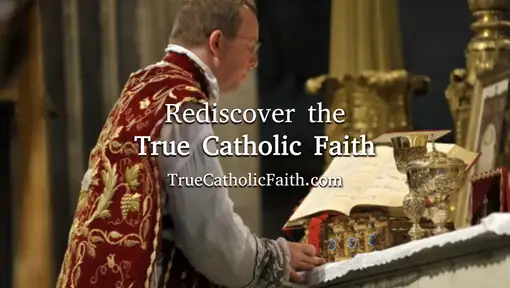Modernist Compassion vs. Our Lord's Compassion - Fr. James Marshall 07-26-25
Download MP3In the name of the Father, and of the Son, and of the Holy Ghost. Amen.
Fr. James Marshall:Hail Mary, full of grace, the Lord is with thee. Blessed art thou amongst women, and blessed is the fruit of thy womb, Jesus. Holy Mary, mother of God, pray for us sinners now and at the hour of our death. Amen.
Fr. James Marshall:Dear faithful, in today's gospel, our Lord has compassion for the great multitude who has faithfully accompanied him for three days. He knows that they are hungry and exhausted, and that they will faint on the way home if they don't have something to eat. So he takes the seven loaves that the disciples have with them. He gives thanks and breaks them, and then he directs the disciples to set them before the people.
Fr. James Marshall:He then blesses the few little fish that the disciples also have and sets them before the people. The 4,000 men, along with women and children, eat that day and are somehow satisfied. The Lord then sends them home. Two incidents of our Lord's multiplication of loaves and fishes are recounted by the gospel writers. One incident begins with five loaves and two fishes, and it ends with 12 baskets of leftovers.
Fr. James Marshall:The other incident, the one recounted in today's gospel, begins with seven loaves and a few little fishes, and it ends with seven baskets of leftovers. The five loaves and 12 baskets of leftovers in the first incident represent the Jewish people. The five loaves symbolizing the Torah, the five first books of the Jewish scripture, and the 12 baskets of leftovers symbolizing the 12 tribes of Israel. This incident highlights that Jesus Christ is the fulfillment of all Jewish expectation and hunger. In contrast, the seven loaves and seven baskets of leftovers in the second incident represent all the Gentile nations.
Fr. James Marshall:The book of Deuteronomy listing seven of them. Moreover, the number seven signifies fulfillment and so points to the fulfillment of Gentile hunger in Jesus Christ. Together, the two incidents of our Lord's multiplication of loaves and fishes demonstrate the catholicity, that is the universality of his compassion, that it is offered to all people, Jew and Gentile alike. Indeed, the Lord's establishing of the Catholic church as the one church outside of which there is no salvation is the supreme expression of his compassion. Our Lord's multiplication of the loaves and fishes is also a prefigurement of the holy Eucharist instituted by him at the last supper in which his body and blood, which he gave to the apostles as food and drink, would be sacrificed on the cross the following day.
Fr. James Marshall:Our Lord's bloody sacrifice on the cross would be the same sacrifice perpetuated in an unbloody manner throughout the centuries at every mass until the end of time for the unmerited salvation of humanity. What divine compassion. The act of giving thanks in distributing the bread that was part of the multiplication of loaves and fishes points to the last supper and the sacrifice of Christ, who is the bread of life and who provides for all who come to him worthily in the sacraments of the church. Important to note is that the gospel writers' recountings of the two incidents could not have been more explicit in describing a physical miracle. The fact of the bread and fishes being exceedingly more plenteous after the hungry and exhausted 5,004 were fed, as evidenced by the 12 baskets and seven baskets of leftovers collected, more than the original quantity, highlights the fact that our Lord created huge quantities of bread and fish ex Nikilo, that is out of nothing, which only God could do.
Fr. James Marshall:The church has always understood the multiplication of loaves and fishes in this way. Many popes in recent centuries have warned about modernist interpretations of our lord's miracles. Pope Pius the ninth, for instance, warned in his syllabus of errors about the blasphemous idea that the prophecies and miracles set forth and recorded in the sacred scriptures are the fiction of poets and the mysteries of the Christian faith, the result of philosophical investigations. In the books of the old and new testaments, the modernist heretics blasphemously say, there are contained mythical inventions, and Jesus Christ is himself a myth. Pope Pius the tenth, known as the pope against modernism, called modernism the synthesis of heresies.
Fr. James Marshall:He knew that addressing the malignancy of modernism could not have too high a cost because many souls would be lost on account of it. Because of this, the pope saint mandated that every one of his bishops around the world hunt down modernism and crush it. He further commanded that every priest solemnly proclaim an oath against modernism as a prerequisite for reception to holy orders, which modernist Paul the sixth abolished in 1967. When approached by cardinal advisers to reconsider his condemnation of the modernist heresy, proposing that he adopt a more conciliatory tone and suggesting that the church would be better served by fruitful dialogue, Pope Pius the tenth famously responded. You want the modernists to be treated with oil, soap, and caresses, but they should be beaten with fists.
Fr. James Marshall:In a duel, you don't count or measure the blows, you strike as you can. Dear faithful, modernism reduces our Lord's miracles from supernatural events to naturalistic events. Modernists assert, for example, that Our Lord's curing of the sick was no different from what so many physicians daily accomplish with modern medications and treatments to cure ailments, which are often of psychosomatic origin anyway. That his casting out of demons was no different from a psychologist's treatment of psychological illnesses, which make those afflicted appear to be possessed. And that his stillings of the storm at sea was really a calming of the stormy and conflicted souls of his apostles in the boat.
Fr. James Marshall:The highest profile modernist of our day is Leo the fourteenth, the current false occupant of the papal throne. He interprets our lord's multiplication of the loaves and fishes in the same way his false pope predecessor, Francis, interpreted the event, as a miracle of sharing. At a recent United Nations conference, the false pontiff stated in reference to the multiplication of loaves and fishes that the real miracle performed by Christ was to show that the key to overcoming hunger lies in sharing rather than in greedily hoarding. To elaborate, the typical modernist would contend that in the incident, some among the multitude came with bread hidden in their clothes and were miraculously moved by a spirit of sharing. When the time was right instead of hoarding the bread for themselves.
Fr. James Marshall:Now it is true that sharing is an excellent activity, but sharing is a natural activity and not a supernatural activity. It is an expression of human compassion and not of divine compassion. Saint Augustine affirmed the Lord's miracles in his statement that our Lord multiplied in his hands five loaves, which were multiplied by him who made the earth. Again, Saint Augustine again, Saint Augustine affirmed the Lord's miracles in his statement that our Lord multiplied in his hands the five loaves which were multiplied by him who made the earth. Only God could perform such a miracle, in other words.
Fr. James Marshall:Again, Saint Augustine affirmed the Lord's miracle in his statement that our Lord multiplied in his hands the five loaves, which were multiplied by him who made the earth. Indeed, only God could make the earth. The false pope's interpretation, however, removes the necessity of our lord from the equation since the crowd was able to share and thus feed themselves. Following this blasphemy to its logical conclusion, the modernist would have to say that it has not been Christ over the centuries that has fed and sustained the church, but rather the people themselves. Christ having only set the example two thousand years ago.
Fr. James Marshall:They would say he didn't perform the miracle. He only set the example two thousand years ago for the future miracles that would be at the hands of the people. In short, modernists think they are God and deny that Jesus Christ is God. They hate the fact that Jesus Christ claims that he is God, and they hate the fact that they would have to depend on Jesus Christ for their salvation and not on themselves. The words of the false pontiff are no different from those of the serpent in the Garden of Eden, who in essence told Eve, don't believe that God has told you through Adam about not eating from the tree of the knowledge of good and evil, believe me instead.
Fr. James Marshall:Leo the fourteenth tells the faithful likewise. Don't believe what God has told you through the past teaching authority of the church about the Lord's miracle of the multiplication of loaves and fishes. Believe rather me instead. Dear faithful, we must have nothing to do with Leo the fourteenth. We must denounce him and his false teachings.
Fr. James Marshall:He feeds the church the poison of modernism, like his Vatican two false pope predecessors. Let us thus recommit ourselves to the study of the teachings of the Catholic church, taking the advice of Pope Saint Pius the tenth, and fighting the heresy of modernism with all our strength. And through the intercession of Our Lady, the seat of wisdom, let us affirm the divinity of her son and his miracles, knowing that he saves those who do not depart from him and his holy Catholic church. Holy Mary, mother of God, pray for us sinners now and at the hour of our death. Amen.
Fr. James Marshall:In the name of the father, and of the son, and of the holy ghost. Amen.
Creators and Guests


